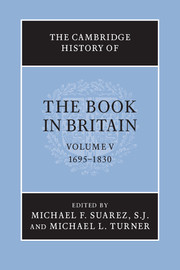Book contents
- Frontmatter
- Introduction
- PART I THE QUANTITY AND NATURE OF PRINTED MATTER
- PART II ECONOMIC, LEGAL AND CULTURAL CONTEXTS
- PART III THE TECHNOLOGIES AND AESTHETICS OF BOOK PRODUCTION
- PART IV THE BOOK TRADE AND ITS MARKETS
- V BOOKS AND THEIR READERS
- I RELIGIOUS BOOKS
- II LITERATURE AND THE CULTURE OF LETTERS
- III SPECIALIST BOOKS AND MARKETS
- 38 Collecting and the antiquarian book trade
- 39 The Stationers’ Company and the almanack trade
- 40 Children’s books and school-books
- 41 Music
- 42 Maps, charts and atlases in Britain, 1690–1830
- 43 Enlarging the prospects of happiness: travel reading and travel writing
- 44 Law books
- 45 Philosophical books
- 46 Scientific and medical books, 1695–1780
- 47 Scientific and medical books, 1780–1830
- 48 ‘Radical publishing’
- 49 Mining the archive: a guide to present and future book-historical research resources
- Abbreviations used in bibliography
- Bibliography
- Index
- Frontispiece
- Plate section
- References
41 - Music
from III - SPECIALIST BOOKS AND MARKETS
Published online by Cambridge University Press: 28 September 2010
- Frontmatter
- Introduction
- PART I THE QUANTITY AND NATURE OF PRINTED MATTER
- PART II ECONOMIC, LEGAL AND CULTURAL CONTEXTS
- PART III THE TECHNOLOGIES AND AESTHETICS OF BOOK PRODUCTION
- PART IV THE BOOK TRADE AND ITS MARKETS
- V BOOKS AND THEIR READERS
- I RELIGIOUS BOOKS
- II LITERATURE AND THE CULTURE OF LETTERS
- III SPECIALIST BOOKS AND MARKETS
- 38 Collecting and the antiquarian book trade
- 39 The Stationers’ Company and the almanack trade
- 40 Children’s books and school-books
- 41 Music
- 42 Maps, charts and atlases in Britain, 1690–1830
- 43 Enlarging the prospects of happiness: travel reading and travel writing
- 44 Law books
- 45 Philosophical books
- 46 Scientific and medical books, 1695–1780
- 47 Scientific and medical books, 1780–1830
- 48 ‘Radical publishing’
- 49 Mining the archive: a guide to present and future book-historical research resources
- Abbreviations used in bibliography
- Bibliography
- Index
- Frontispiece
- Plate section
- References
Summary
The dissemination history of music is shaped by a fundamental difference in comparison with the regular book trade, its authors and readers. Music on the page lacks the immediacy of apprehension that linguistic and even numeric text affords its readers. Unlike drama, written music requires performance in order for the signs to become meaningful to all but the most adept proficients. Music requires two special skills in order to be performed – musical literacy and performance ability – both of which necessitate training and practice. Two or more persons are usually required to make the text sound and the text may exist only as separate parts until performed. Performance is often restricted to specific instruments. Unlike the three Rs, music-making is not regarded as a skill necessary to worldly advancement, and thus must be specifically encouraged. The expense of the training and equipment, coupled with the need for active promotion, mean that music’s diffusion through the purchase of texts and their transformation through performance is restricted. Music written in score or for keyboard instruments such as harpsichord or organ requires both horizontal and considerable vertical page space in which to unfold, and thus entails a different approach to printing. Like the trading of books in Latin during earlier times, music is distributable anywhere western notation is understood. These differences of use, market, technology, education and social utility will be highlighted in what follows, but they should not completely obscure the similarities – such as concerns with intellectual property protection, textual accuracy, technological advances, taxation, methods of distribution and profitability – between music and the other systems in the universe of textual reproduction.
- Type
- Chapter
- Information
- The Cambridge History of the Book in Britain , pp. 750 - 761Publisher: Cambridge University PressPrint publication year: 2009
References
- 1
- Cited by



